Fishes, Amphibians, and Reptiles -> evaporation
Evaporation
Evaporation is the process by which a liquid turns into a gas. This occurs when the molecules in a liquid gain enough energy to break free from the liquid's surface and become a gas. The most common example of evaporation is when water on the surface of the Earth turns into water vapor due to the heat from the sun.
Factors Affecting Evaporation
- Temperature: Higher temperatures increase the rate of evaporation as they provide more energy for the liquid molecules to escape into the gas phase.
- Surface Area: Larger surface areas lead to increased evaporation as more molecules are exposed to the air and can escape into the gas phase.
- Humidity: Lower humidity levels (dry air) lead to faster evaporation as the air can hold more water vapor, creating a concentration gradient that promotes evaporation.
- Wind: Increased air movement (wind) can carry away the water vapor molecules from the liquid's surface, promoting evaporation.
Applications of Evaporation
Evaporation has several important applications, such as:
- Water Cycle: Evaporation from the Earth's surface is a key part of the water cycle, leading to the formation of clouds and precipitation.
- Salt Production: Evaporation is used to produce salt from seawater, where the water is evaporated, leaving behind the salt crystals.
- Food Preservation: Evaporation is used in food preservation techniques such as drying fruits and vegetables to extend their shelf life.
- Distillation: Evaporation is a key process in distillation, where a liquid is heated to produce vapor and then condensed back into a liquid to separate its components.
Study Guide
- Define evaporation and explain the process in detail.
- Discuss the factors that affect the rate of evaporation.
- Provide examples of how evaporation is used in everyday life and various industries.
- Explain the role of evaporation in the water cycle.
- Conduct an experiment to demonstrate the effect of different factors on the rate of evaporation (e.g., temperature, surface area).
Make sure to understand the concept of evaporation thoroughly and be able to apply it to real-life situations and examples.
.◂Science Worksheets and Study Guides Sixth Grade. Fishes, Amphibians, and Reptiles
Study Guide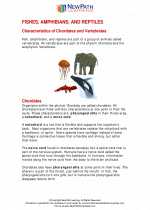 Fishes, Amphibians, and Reptiles
Fishes, Amphibians, and Reptiles  Activity Lesson
Activity Lesson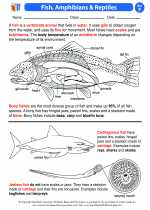 Fish, Amphibians & Reptiles
Fish, Amphibians & Reptiles  Worksheet/Answer key
Worksheet/Answer key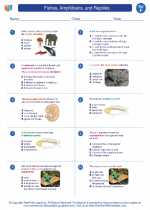 Fishes, Amphibians, and Reptiles
Fishes, Amphibians, and Reptiles  Worksheet/Answer key
Worksheet/Answer key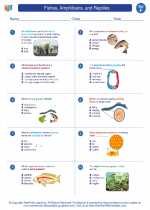 Fishes, Amphibians, and Reptiles
Fishes, Amphibians, and Reptiles  Worksheet/Answer key
Worksheet/Answer key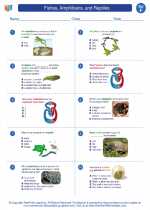 Fishes, Amphibians, and Reptiles
Fishes, Amphibians, and Reptiles  Worksheet/Answer key
Worksheet/Answer key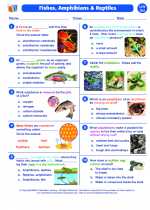 Fishes, Amphibians, and Reptiles
Fishes, Amphibians, and Reptiles  Vocabulary/Answer key
Vocabulary/Answer key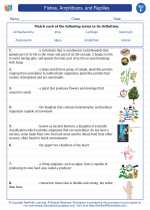 Fishes, Amphibians, and Reptiles
Fishes, Amphibians, and Reptiles  Vocabulary/Answer key
Vocabulary/Answer key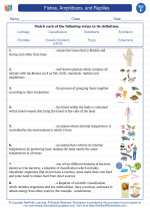 Fishes, Amphibians, and Reptiles
Fishes, Amphibians, and Reptiles  Vocabulary/Answer key
Vocabulary/Answer key Fishes, Amphibians, and Reptiles
Fishes, Amphibians, and Reptiles  Vocabulary/Answer key
Vocabulary/Answer key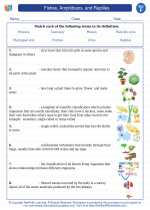 Fishes, Amphibians, and Reptiles
Fishes, Amphibians, and Reptiles  Vocabulary/Answer key
Vocabulary/Answer key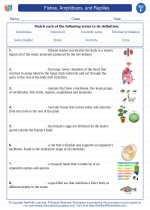 Fishes, Amphibians, and Reptiles
Fishes, Amphibians, and Reptiles 

 Activity Lesson
Activity Lesson
 Worksheet/Answer key
Worksheet/Answer key
 Worksheet/Answer key
Worksheet/Answer key
 Worksheet/Answer key
Worksheet/Answer key
 Worksheet/Answer key
Worksheet/Answer key
 Vocabulary/Answer key
Vocabulary/Answer key
 Vocabulary/Answer key
Vocabulary/Answer key
 Vocabulary/Answer key
Vocabulary/Answer key
 Vocabulary/Answer key
Vocabulary/Answer key
 Vocabulary/Answer key
Vocabulary/Answer key

The resources above cover the following skills:
LIFE SCIENCE
From Molecules to Organisms: Structures and Processes